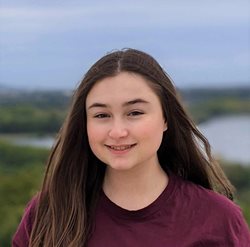Awarded poster at the 17th International Wolfsberg Meeting on Molecular Radiation Biology/Oncology
Hurdal, Norway, 21-23 June 2025
By Mélissandre Gomot, travel grant awardee
The International Wolfsberg Meeting on Molecular Radiation Biology/Oncology was first recommended to me for its excellent scientific reputation in the field of radiation oncology. I attended expecting to gain specific insights relevant to my research and to broaden my knowledge about radiation oncology and its current focus. My expectations were fully met. New concepts were presented, precise mechanisms were detailed, and current challenges were discussed. I was especially grateful to be given the opportunity to co-chair the “Intra- and Intercellular Signalling” session with Martin Pruschy (University Hospital Zurich, Switzerland) and to present my poster on the effect of low-dose medical radiation on colon carcinogenesis.
My research project is intended to determine whether low-dose exposure to ionising radiation (X-rays) during CT scans affects colon carcinogenesis, and to characterise its effects at physiological, cellular and molecular levels. To address this question, we are using the transgenic KPC:APC mouse model and have developed the new KPC:APC inducible colon organoid model. Our recent findings after use of both models indicate that the impact of low-dose medical radiation is strongly dependent on the carcinogenesis stage as well as the mutational state of the colonic epithelium at the time of exposure. Further research will allow us to elucidate precisely the underlying mechanisms and to assess accurately the risk for patients undergoing CT scans. Discussions with other researchers during this congress provided valuable feedback and inspired new hypotheses, ideas and opportunities for future developments.
These exchanges with fellow researchers were, for me, the most valuable part of the Wolfsberg Meeting. The whole programme, from the extensive poster sessions to the team-building event, was designed to foster scientific discussion and to favour connections with new colleagues in each visitor’s specific field. As a PhD student, I often find it challenging to engage with new researchers when attending a conference by myself. Here, however, the discussions flowed naturally with both early career and experienced researchers, and this created a favourable environment in which to learn and create new collaborations. In this supportive atmosphere, I learned a lot, both scientifically and professionally. As I am in the final year of my PhD, I had the opportunity to discuss not only purely scientific questions but also researchers’ career paths. I received advice, opinions and people’s experiences related to career development in academic and non-academic research. I came back from this congress with helpful guidance that will help me select my future research projects and shape my career.
Overall, the International Wolfsberg Meeting on Molecular Radiation Biology/Oncology provided me with a great opportunity to share and discuss my research with specialists in my field, and to learn and grow as a young researcher.

Mélissandre Gomot
Nuclear Safety and Radiation Protection Authority (ASNR)
Fontenay-aux-roses, France